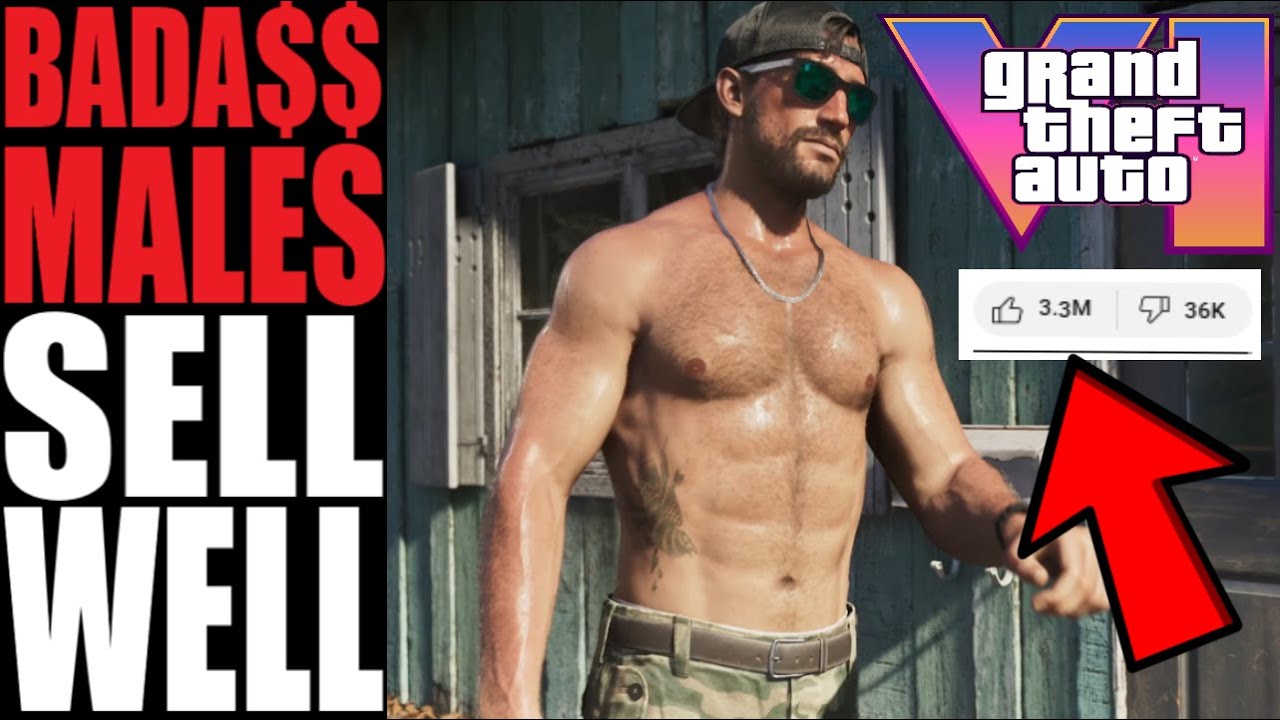Grand Theft Auto 6’s New Trailer Sparks Debate with Male-Centric Marketing Shift
A Deliberate Pivot: Targeting the Male Audience
On May 6, 2025, Rockstar Games unleashed the second trailer for Grand Theft Auto VI (GTA 6), a cinematic spectacle that has reignited excitement for the franchise’s return to Vice City. However, the trailer’s marketing approach has sparked intense discussion, with fans and critics noting a deliberate shift toward appealing to a male audience, moving away from the broader, inclusive “modern audience” often targeted by contemporary AAA games. The nearly three-minute trailer, packed with high-octane action, scantily clad women, and a focus on male protagonist Jason Duval, has been described as a throwback to the franchise’s edgy, male-driven roots, prompting both praise and backlash across platforms like X. This bold pivot, seen as a response to cultural debates in gaming, has positioned GTA 6 as a lightning rod for controversy, raising questions about representation, marketing strategy, and the series’ identity.

The trailer emphasizes Jason Duval, a rugged, weightlifting criminal who takes center stage in scenes of heists, car chases, and prison interactions, with his female counterpart, Lucia Caminos, appearing more as a supportive partner than the co-lead highlighted in the first trailer. Social media reactions on X have been vocal, with users like @TylerGworek noting, “This video focuses on the Guy, on his beer, on His girlfriend, on guns, on Country music, and on women shaking their asses,” suggesting a deliberate appeal to traditional masculine tropes. Others, like @FinanceBanking9, claimed, “New GTA VI trailer seems way more geared towards men and masculinity. She’s now his sidekick instead of the main lead.” The trailer’s 1980s-inspired soundtrack, featuring Wang Chung’s “Everybody Have Fun Tonight,” and visuals of crowded nightclubs and beach parties further amplify a vibe some describe as catering to a “bro” demographic, contrasting with the first trailer’s focus on Lucia and a more diverse Vice City.
Why the Shift? Responding to Industry Trends
The decision to target a male audience appears to be a calculated response to recent industry backlash against diversity, equity, and inclusion (DEI) initiatives in gaming. Posts on X, such as one from @saka_1c, suggest that Rockstar’s internal testing may have shown fans feared a “feminist girlboss” narrative with Lucia as the lead, prompting a pivot to a “Bonnie and Clyde lovers-on-the-run vibe” centered on Jason. This aligns with broader sentiments in gaming communities, where titles like Assassin’s Creed Shadows and Star Wars Outlaws faced criticism for perceived “woke” elements. Rockstar, known for its satirical take on American culture, seems to be doubling down on the franchise’s irreverent, male-centric roots, with the trailer showcasing bikini-clad NPCs, strip clubs, and Jason’s physicality, including a weightlifting scene reminiscent of GTA San Andreas’s body customization mechanics.
The trailer’s focus on masculinity has been praised by some as a return to form for GTA, a series historically marketed toward young male players. On X, users like @GameCharacterAI noted the trailer’s emphasis on “objectifying men” and “women commenting [on] men’s looks,” with minimal reciprocal focus on female characters beyond brief bikini shots, suggesting a deliberate skew toward male fantasies. However, critics argue this approach risks alienating a broader audience, particularly female and progressive gamers who welcomed Lucia as the series’ first female protagonist. The first trailer, released in December 2023, had faced mixed reactions for introducing Lucia, with some fans on X decrying a “woke” agenda, while others celebrated the inclusivity. The second trailer’s shift, with Lucia relegated to a secondary role, has led to accusations of backtracking, with @badguy974 questioning, “No magic, selling a lot of sex… but woke allows this?”
The Marketing Strategy: A Departure from Modern Norms
Rockstar’s marketing for GTA 6 has been unconventional, with only two trailers released despite a May 26, 2026, launch date. Take-Two Interactive’s CEO, Strauss Zelnick, has defended this approach, stating that marketing materials are best released close to launch to maximize anticipation, a strategy that contrasts with the year-long campaigns of titles like Call of Duty. The second trailer’s male-focused tone aligns with this concentrated push, aiming to generate buzz among the franchise’s core demographic—historically young men—while leveraging the game’s unprecedented hype, which Zelnick called the greatest for any entertainment property. The trailer’s 21 million YouTube views and 1.3 million likes within hours attest to its impact, but the shift has raised eyebrows.
The trailer’s content, including Jason’s prison scenes, a six-pack of beer, and a PS5-style console in their home, emphasizes a gritty, masculine aesthetic, with Lucia’s role limited to romantic and supportive moments, like lounging with Jason or wielding a grenade launcher. This contrasts sharply with the first trailer, which showcased Lucia’s parole interview and suggested a balanced partnership. On X, @blisstweeting observed, “Such a huge vibe shift… The male protagonist was shown for like 10 seconds total back in 2023… Now basically the entire time is either him or their heteronormative couple.” The emphasis on a “heteronormative” dynamic, with country music and traditional gender roles, has been interpreted as a rejection of the “modern audience” often associated with inclusive, progressive narratives.
Fan Reactions: A Divided Community
The reaction to the trailer’s male-centric focus has been polarized. Supporters, particularly on X, have celebrated Rockstar’s pivot, with @TPPNewsNetwork noting the trailer’s focus on Jason as a bold move that garnered massive engagement. Some fans see it as a course correction, with @topdoog11 arguing that the trailer “tried too hard to beat woke allegations” by focusing on “mc ass” (male character appeal) and guns, though they criticized its lack of gameplay and weaker music compared to GTA V’s trailers. Others, like @Pirat_Nation, praised the “Bonnie and Clyde” narrative, suggesting it resonates with the series’ crime-driven ethos. These fans view the shift as a return to GTA’s roots, appealing to players who crave the unapologetic chaos of earlier titles like Vice City and San Andreas.
Critics, however, argue that the trailer alienates a diverse fanbase. On Reddit, users in the r/GTA6 community expressed disappointment, with one writing, “Lucia was the star of the first trailer, now she’s just Jason’s girlfriend? Feels like a step back.” Female gamers, in particular, have voiced frustration, noting that Lucia’s reduced role undermines the promise of a co-lead protagonist. The trailer’s emphasis on sexualized imagery, such as women twerking on cars, has also drawn ire, with some calling it “cringe” and regressive. On X, @badguy974 lamented the lack of the “magic” from the first trailer, questioning the overt focus on sex appeal. The debate reflects broader tensions in gaming, where efforts to broaden appeal often clash with demands to cater to traditional audiences.
The Industry Context: Navigating a Cultural Minefield
The GTA 6 trailer’s male-focused marketing comes at a time of heightened scrutiny over representation in gaming. Recent controversies, such as backlash against Concord’s diverse cast or Star Wars Outlaws’ female lead, have fueled a narrative that DEI initiatives are “failing” to resonate with core gamers. Posts on X suggest Rockstar is responding to these trends, with @FinanceBanking9 claiming the studio is “paying attention to the billions lost in the gaming industry chasing DEI narratives.” The trailer’s focus on Jason, guns, and traditional masculinity aligns with a push to recapture the franchise’s original demographic, which skewed heavily male in the GTA III and Vice City eras. However, this risks alienating players who embraced GTA V’s broader appeal and the first trailer’s inclusive tone.
Rockstar’s history of satire, evident in GTA’s parodies of American excess, complicates the narrative. The trailer’s social media-inspired visuals, including TikTok-like clips and a “Florida Joker” cameo, suggest a commentary on modern culture, but its male-centric framing has been criticized as pandering rather than critiquing. The game’s reported $2 billion budget, one of the largest in gaming history, underscores the stakes, with Rockstar betting on a blockbuster that appeals to its core audience while navigating cultural sensitivities. The trailer’s success in generating buzz—21 million views in hours—proves its effectiveness, but the backlash highlights the challenge of balancing tradition with progress.
Implications for GTA 6’s Future
The male-focused trailer sets the tone for GTA 6’s marketing as it approaches its May 2026 release. By emphasizing Jason and masculine tropes, Rockstar is signaling a return to the franchise’s rebellious, unapologetic roots, potentially at the cost of broader inclusivity. The game’s narrative, described as a “Bonnie and Clyde” tale of Jason Duval and Lucia Caminos, promises a dual-protagonist structure, but the trailer’s imbalance suggests Jason may dominate the spotlight. Gameplay innovations, such as customizable character appearances and enterable buildings, hinted at in the trailer, could appeal to all players, but the marketing’s tone may shape perceptions of the game’s identity.
The controversy could influence future trailers, with Rockstar possibly adjusting to address criticism or doubling down on its current strategy. The game’s success, given its massive budget and cultural weight, will depend on delivering a Vice City that feels immersive and authentic, regardless of marketing. For now, the trailer has achieved its goal of sparking conversation, with fans dissecting every frame for clues about gameplay and story. Whether GTA 6 can bridge its traditional roots with modern expectations remains to be seen, but its male-centric pivot has ensured it’s the talk of the gaming world.
Looking Ahead: A High-Stakes Gamble
Grand Theft Auto VI’s second trailer has cemented its status as a cultural juggernaut, but its male-focused marketing has sparked a firestorm. By prioritizing Jason Duval and masculine appeal, Rockstar is betting on its core audience while navigating a polarized industry landscape. The backlash from fans who championed Lucia’s role highlights the risks of this approach, but the trailer’s massive engagement proves its power to captivate. As GTA 6 barrels toward its 2026 release, the debate over its marketing will shape its legacy, proving that even a single trailer can ignite a global conversation about gaming, identity, and culture.





